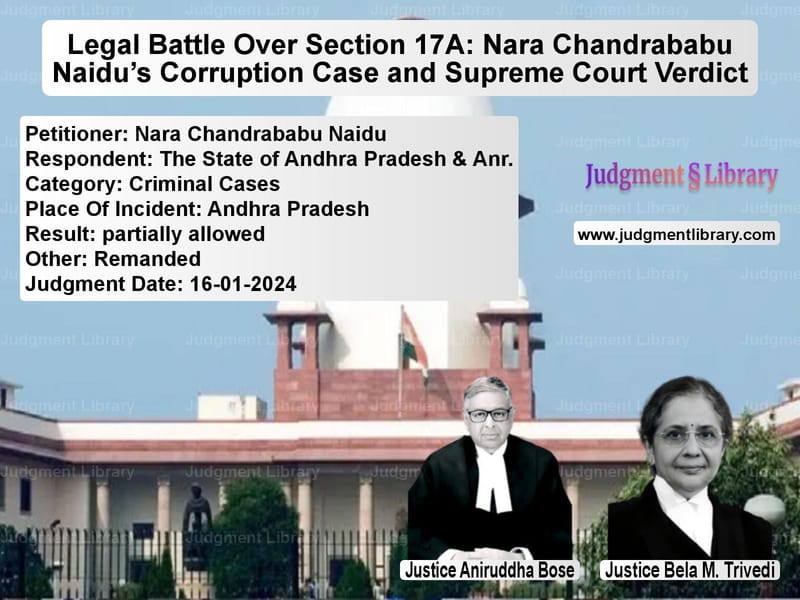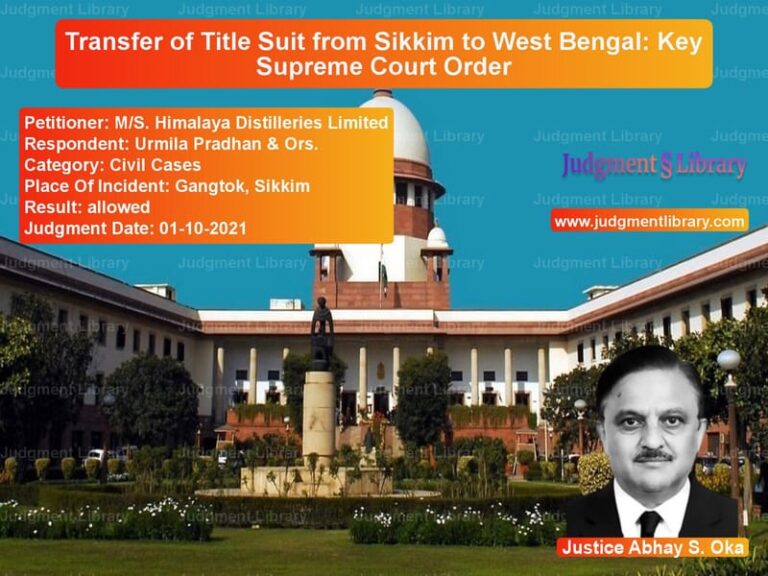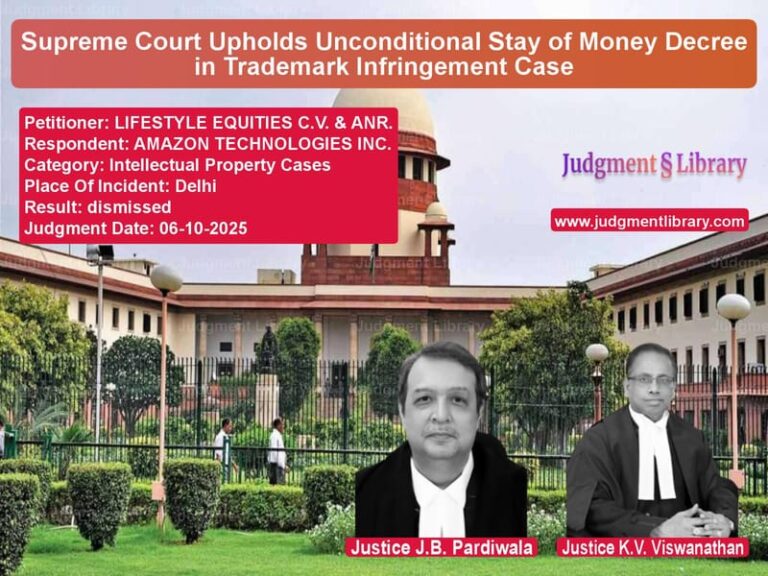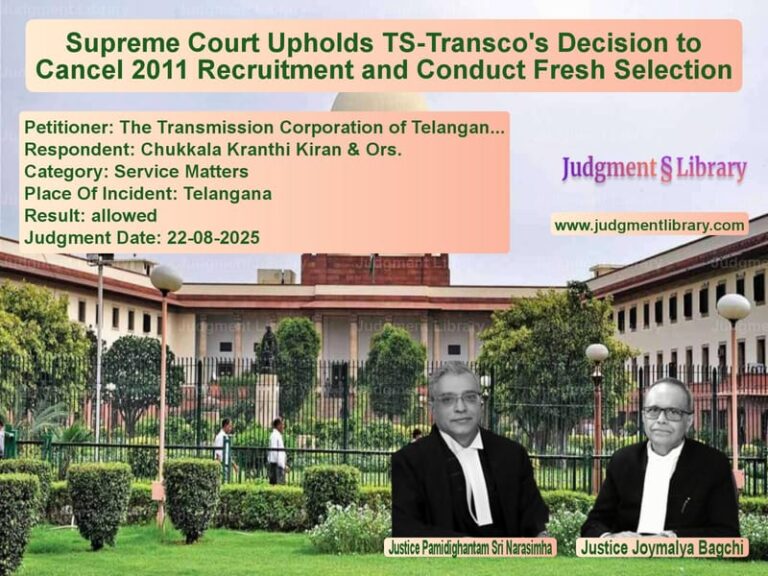Legal Battle Over Section 17A: Nara Chandrababu Naidu’s Corruption Case and Supreme Court Verdict
The case involving Nara Chandrababu Naidu and the State of Andhra Pradesh has drawn significant legal and public attention due to the complex interpretation of Section 17A of the Prevention of Corruption Act, 1988. This case revolves around the alleged misappropriation of government funds meant for skill development initiatives and the legal questions regarding the applicability of Section 17A to corruption cases initiated after its introduction in 2018.
Background of the Case
Nara Chandrababu Naidu, the former Chief Minister of Andhra Pradesh, was implicated in a case related to the alleged diversion of public funds amounting to approximately Rs. 370 crores. The funds were intended for the establishment of skill development centers in Andhra Pradesh through a partnership with private firms Siemens Industry Software India Pvt. Ltd. and DesignTech India Pvt. Ltd. The Andhra Pradesh State Skill Development Corporation (APSSDC) was the implementing body for this initiative.
The allegations against Naidu include financial mismanagement, manipulation of contracts, and violation of due process in awarding projects without following proper tendering procedures. The government argues that the project was fast-tracked without appropriate scrutiny, leading to undue financial benefits for certain private entities.
Legal Charges Against Nara Chandrababu Naidu
The State of Andhra Pradesh, through its Criminal Investigation Department (CID), initiated proceedings against Naidu under various sections of the Indian Penal Code (IPC) and the Prevention of Corruption Act, 1988, including:
- Sections 166, 167, 418, 420, 465, 468, 471, 409, 209, and 109 read with Sections 120-B, 34, and 37 of IPC.
- Sections 12 and 13(2) read with Sections 13(1)(c) and (d) of the Prevention of Corruption Act, 1988.
These charges primarily relate to the alleged misuse of government funds and procedural violations in executing the skill development project.
Petitioner’s Arguments
Naidu’s legal team, led by senior advocates Harish Salve and Siddharth Luthra, presented several arguments in the Supreme Court, contending that the case against him was politically motivated and legally flawed. Their primary arguments included:
- Non-compliance with Section 17A: The defense argued that under Section 17A of the Prevention of Corruption Act, no investigation into decisions made by a public servant in their official capacity could be initiated without prior approval from the appropriate authority. They contended that since the alleged offenses occurred while Naidu was in office, prior sanction from the competent authority was mandatory but was not obtained.
- Retrospective Application of the Law: The defense asserted that Section 17A, introduced through the 2018 amendment, should apply retrospectively, thereby rendering the investigation against Naidu invalid.
- Political Vendetta: It was also argued that the case was a targeted attack against Naidu and his political party, aiming to undermine his influence in the region.
Respondent’s Arguments
The State of Andhra Pradesh, represented by senior advocates Mukul Rohatgi and Ranjit Kumar, countered these claims with the following arguments:
- Preliminary Inquiry Existed Before Section 17A: The state argued that an inquiry into corruption allegations against APSSDC officials had already begun in June 2018, before Section 17A was introduced. Therefore, the requirement for prior approval was inapplicable.
- Nature of Offense Falls Outside the Scope of Official Duty: The prosecution contended that the acts of criminal misappropriation, forgery, and fraud were not official functions of the Chief Minister and hence did not qualify for protection under Section 17A.
- Public Interest and Rule of Law: The state maintained that public interest necessitated the continuation of the investigation and trial, given the severity of the alleged financial misappropriation.
Supreme Court’s Ruling
The Supreme Court, in a split verdict, examined the legal implications of Section 17A and its applicability to the case. Justice Aniruddha Bose ruled in favor of Naidu, stating that since the inquiry against him commenced after Section 17A was enacted, prior approval was required. Consequently, the court ruled that the charges under the Prevention of Corruption Act could not be pursued without the requisite approval.
However, Justice Bela M. Trivedi took a different stance, arguing that Section 17A was not intended to provide blanket immunity for corruption and should not be applied retrospectively. She emphasized that allowing such an interpretation would hinder anti-corruption efforts and provide undue protection to public officials engaging in fraudulent activities.
Due to the conflicting opinions, the matter was referred to a larger bench for final adjudication.
Legal Implications of the Judgment
This case raises crucial questions about the scope and applicability of Section 17A:
- Should Section 17A apply retrospectively, affecting ongoing investigations?
- How should courts determine whether an action falls within the scope of “official duties”?
- Can prior inquiries negate the requirement for approval under Section 17A?
The ruling will likely set a precedent for future corruption cases involving public officials.
Conclusion
The Supreme Court’s decision in this case highlights the complex interplay between legal provisions and their interpretations in corruption cases. While the ruling provides temporary relief to Naidu regarding charges under the Prevention of Corruption Act, the proceedings related to IPC offenses continue. As the case moves to a larger bench, it will be instrumental in shaping the jurisprudence surrounding Section 17A and the accountability of public officials.
Petitioner Name: Nara Chandrababu Naidu.Respondent Name: The State of Andhra Pradesh & Anr..Judgment By: Justice Aniruddha Bose, Justice Bela M. Trivedi.Place Of Incident: Andhra Pradesh.Judgment Date: 16-01-2024.
Don’t miss out on the full details! Download the complete judgment in PDF format below and gain valuable insights instantly!
Download Judgment: nara-chandrababu-nai-vs-the-state-of-andhra-supreme-court-of-india-judgment-dated-16-01-2024.pdf
Directly Download Judgment: Directly download this Judgment
See all petitions in Bail and Anticipatory Bail
See all petitions in Money Laundering Cases
See all petitions in Fraud and Forgery
See all petitions in Judgment by Aniruddha Bose
See all petitions in Judgment by Bela M. Trivedi
See all petitions in partially allowed
See all petitions in Remanded
See all petitions in supreme court of India judgments January 2024
See all petitions in 2024 judgments
See all posts in Criminal Cases Category
See all allowed petitions in Criminal Cases Category
See all Dismissed petitions in Criminal Cases Category
See all partially allowed petitions in Criminal Cases Category







